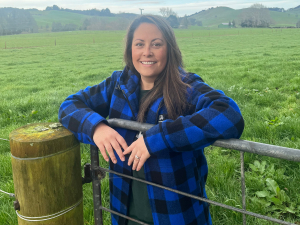Environmental leaders meet to talk innovation, solutions
The chair of the Dairy Environmental Leaders (DEL) says the country's dairy farmers are at the forefront of environmental management.
 National DEL chair and Hunua dairy farmer Amber Carpenter says feedback from those attending was positive.
National DEL chair and Hunua dairy farmer Amber Carpenter says feedback from those attending was positive.
Leading farmers from around New Zealand connected to share environmental stories and inspiration and build relationships at the Dairy Environment Leaders (DEL) national forum in Wellington last month.
The March 12-14 forum gave the 70 attending farmers an opportunity to share and seek inspiration around how they will continue to drive environmental progress in their respective regions.
The forum, based on a ‘whanaungatanga for future success’ theme, sought to establish connection among attendees as they continue to reduce their environmental footprint and support their communities.
National DEL chair and Hunua dairy farmer Amber Carpenter says feedback from those attending was positive, with farmers and speakers enjoying the chance to connect, share experiences and learn from each other.
“We look forward to building on the connections made and strengthened at the forum as the dairy sector continues to contribute positively to New Zealand’s environment and economy. These connections help the sector accelerate positive change.”
The programme included Mavis Mullins, a fifth-generation farmer, agribusiness leader and Member of the New Zealand Order of Merit, who shared te ao Māori insights into improving waterway health and working collaboratively to support water quality outcomes.
Taranaki dairy farmer Damian Roper spoke about the positive relationships he and his wife Jayne have with key stakeholders in their community, and how that supports their focus on reducing on-farm environmental footprint, building biodiversity and farming holistically – with people, animals and the environment at the centre of their business. He also shared how he and Jayne have built a traditional pā to help bring native trees and Māori values back to the family farm, and how he has embraced learning te reo.
Other speakers included former Opposition Leader Todd Muller, who highlighted the importance of connection in terms of prioritising his own mental health and wellbeing.
“The line-up of speakers was inspirational,” Amber says. “The forum’s focus every year is on inspiring attendees to go back to their farms, communities and regions and continue to do great things. Their actions have positive impacts across the sector.”
DairyNZ general manager farm systems and policy Dr David Burger says the DEL network’s vision is of environmental stewardship for the future – farmer-led practical change across individual farms, catchments and regions.
“The DELs work hard to encourage the adoption of positive environmental practices. Thanks to their efforts, and those of other dairy farmers around NZ, the sector is embracing environmental change with a positive, future-focused approach.”
Former Fonterra executive Alex Turnbull has been appointed CEO to lead all five Yili Oceania Business Division companies in New Zealand.
Fonterra executive René Dedoncker is leaving the co-operative later this year to lead Australian agribusiness Elders.
Alliance Group and the Southland Stags rugby team have joined forces in a partnership that will see the the meat co-operative's farmgate brand feature on players' team kits and replica jerseys.
Fonterra's plan to expand its organic programme to the South Island is being well received by farmers, the co-op says.
Voting has started for the renewal of DairyNZ's milksolids levy.
The most successful catchment groups in NZ are those that have 'a source to sea' approach.
OPINION: A dairy version of fantasy football has been launched.
OPINION: In recent weeks beaches in Auckland, Wellington and Christchurch have been unsafe to swim in because of recent heavy…